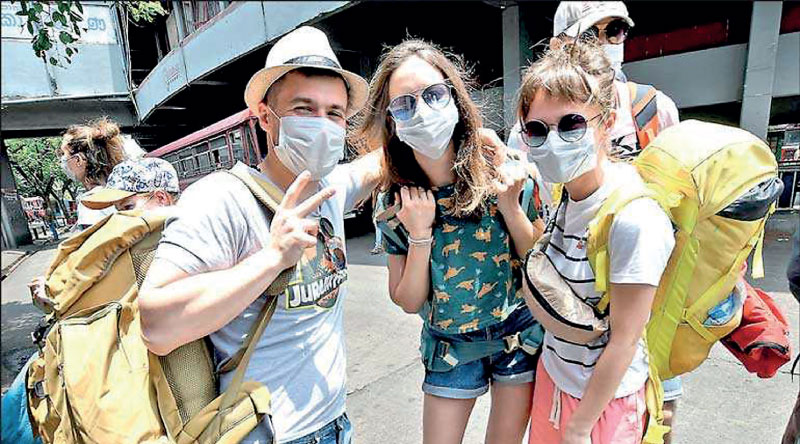Friday Feb 20, 2026
Friday Feb 20, 2026
Thursday, 15 July 2021 00:01 - - {{hitsCtrl.values.hits}}

Post-COVID tourists will be looking for authentic experiences, mostly for untouched destinations to ensure safety – Pic by Shehan Gunasekara
 Tourism was perceived to be one of the fastest growing and imperative economic sectors in the world. It provided livelihoods for millions of people and paved way for millions of others to appreciate different cultures and witness the beauty of the natural world.
Tourism was perceived to be one of the fastest growing and imperative economic sectors in the world. It provided livelihoods for millions of people and paved way for millions of others to appreciate different cultures and witness the beauty of the natural world.
Tourism embodied the third largest export sector of the global economy and it contributed to over 20% of the GDP of certain countries such as Maldives (38.92%), Macao (28.5%), and Seychelles (25.7%). The growth of the sector was unstoppable and resilient.
This entire phenomenon reversed with the advent of the coronavirus, where tourism still remains to be one of the hardest hit sectors by the global pandemic. The outlook for the industry is still indeterminate even after a complete year of uncertainty and living the new normal.
The recurring surges of the virus and the impacts caused by its mutations continue to hit hard on the industry and has made whatever the opportunities of resuming to normalcy very lean. The fear of being exposed to another wave of the virus or any spikes in a region, have kept the travellers at edge, prompting them to check for government travel advisories constantly prior to making any travel plans. The trepidation casted by the virus in the mindsets of the travellers could be considered as one of the main contributors for tourism to be halted.
The tourism statistics published by the UNWTO depicted an 87% fall in international tourist arrivals alone in January 2021 as compared to 2020 since the shocking impacts of the virus have been carried on to 2021 as well.
Further it was stated that the year 2021 started with a substantial decline in the tourist arrivals. Mandatory testing, quarantine requirements, and in some regions the complete closure of borders, have hindered the resumption of international travel.
The resumption of tourism has also been deferred by the slowness in the distribution of the vaccination than expected. The tourist arrivals were expected to decline by 85% only in the first quarter of 2021 as against the same period of 2019. As per UNWTO this represents a loss of 260 million international arrivals when compared to the pre-pandemic periods.
World Travel and Tourism Council (WTTC) estimated the contribution of the sector alone in the region of South Asia to be $ 234 billion in 2019 which attributed to 6.6% of the GDP of the region. The pandemic could not have struck at a much worse time, when the region was achieving steady and fast growth.
Even though domestic tourism contributed to sustain the industry to some extent throughout the year of 2020, it was unable to soften the blow that was created by the virus. This was in spite of the governments taking immediate action to protect the livelihoods of the people who are engaged in the sector and extending its cooperation to protect the businesses.
It was required by the industry and its operators to leverage innovation to sustain its survival in these unprecedented times. Thus, staycations, safe and secure travel options and most importantly travel bubble concepts emerged as the latest trends that encouraged travel which also renewed interest in domestic holiday locations. Also harmonised protocols such as the Digital Green Certificate planned by the European Commission is expected to enhance international travel.
Borders have been opened in Spain for all vaccinated travellers, as has Greece. Whilst the rest of Europe prepares to receive tourists cautiously by the beginning of the month of July 2021.
A significant boost in tourism and the services industries could also be expected in South Asia as well with the simplification of travel restrictions and with accelerated nationwide vaccination programs throughout the region. But the rebound in international travel is mainly dependent on the succession of these vaccination programs and the harmonisation of protocols between regions. If succeeded the industry could restart by the second half of 2021 as per the predictions made by UNWTO.
Overcoming the virus and battling the virus finally rests upon each individual and individual’s responsibility. The surges and spikes of the virus have signified the importance of personal responsibility, as the battle against the virus has finally filtered down to personal obligation towards ourselves and towards society.
As individuals we all should act with responsibility as well-informed persons, abiding by health restrictions, maintaining the mandatory social distancing and by being vaccinated. Constant wearing of a mask, washing of hands and maintaining distance could be perceived as tiresome and insignificant efforts to one. But these simple acts empower us to battle this infectious agent invisible to the naked eye that has caused rapid destruction in such a short span of time.
Governments should make protocols and take steps to educate citizens on the importance of the vaccination program and should encourage individuals to safeguard themselves and the society by being vaccinated. It is our collective efforts which will enable us to defeat this virus and to restore normalcy to life.
Considering the Sri Lankan context, where tourism was in the verge of becoming the third largest foreign exchange earner of the country, the pandemic has placed its economy in a very fragile state. Sri Lanka being heavily dependent on the industry has caused immense hardships to all the stakeholders of the industry. Despite the measures that have been in place to curb the virus, stakeholders could not engage in even domestic tourism activities due to the strict travel restrictions that are imposed island-wide. Recurring outbreaks of the virus has created a highly volatile market which is not favourable.
Even though Sri Lanka is blessed with all the natural vistas and the natural resources that provide the ideal platform for tourism, the tourism industry of the island nation has a history which has been battered and bruised repeatedly; e.g.: the terrorism that prevailed for more than 25 years tore the country’s industry apart, the recent Easter Sunday attacks in 2019 and now the global pandemic COVID-19.
The policymakers in partnership with the stakeholders of the country has to devise a strong tourism relief and recovery plan which is sustainable to restart Sri Lanka tourism with the world resuming to normalcy.
In this context, amidst all the threats that are being imposed by the novel coronavirus, it has also given us the opportunity to rethink our way forward in the industry.
It is time that we revisit our national and regional tourism strategies and align the same with the sustainable development goals and our national commitments.
This has presented us the opportunity to innovate and exploit new technologies, implement green recovery strategies, and to move towards more sustainable practices that have a better balance between the environmental, social and economic aspects of tourism.
Policymakers should work towards converting this threat imposed into an opportunity to reboot the tourism economy on a stronger, impartial and more sustainable footing. The crisis, and the recovery plans that are being put in place, are a once in a lifetime opportunity to move towards more sustainable and resilient models of tourism development.
COVID has taught us to return to our basic values and its importance. Post-COVID tourists will be looking for authentic experiences, mostly for untouched destinations to ensure safety. We should leverage the experience gained and move away from the conventional tourism to provide experiences to the travellers in a more sustainable manner which in return will safeguard the host.
(The writer is Chairman of Asian Council on Tourism and Past President of Hotels Association of Sri Lanka.)